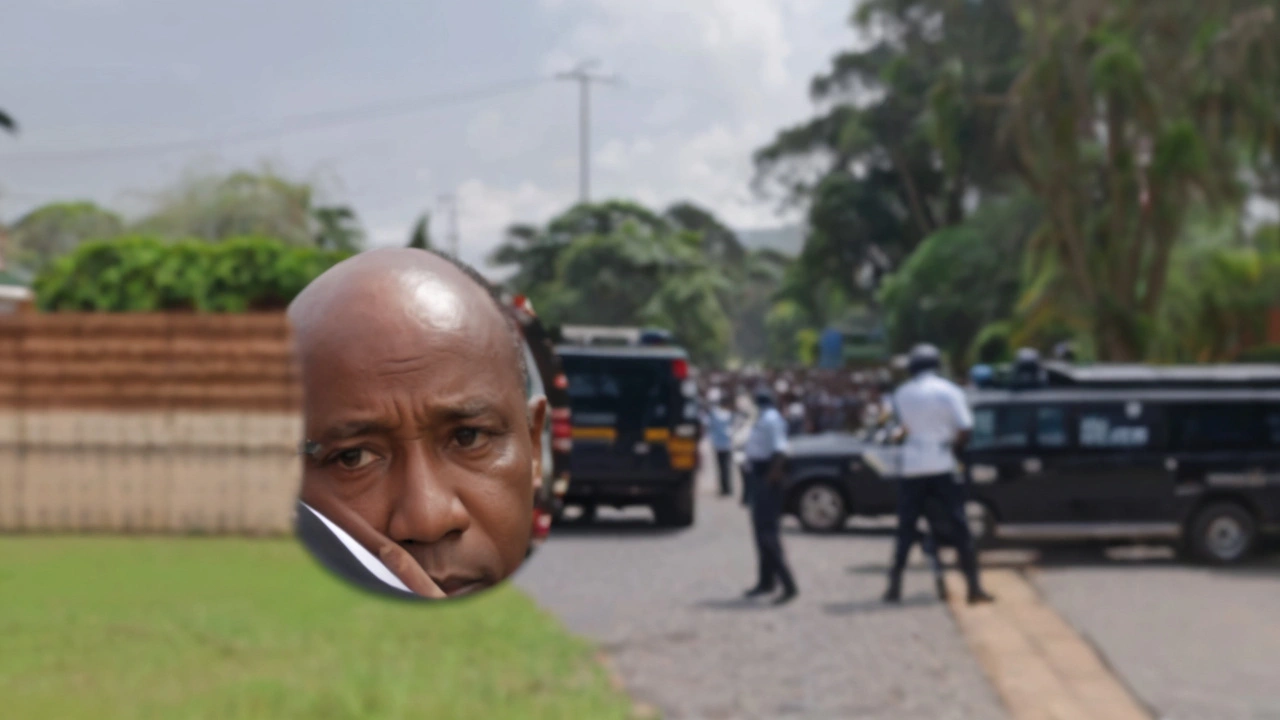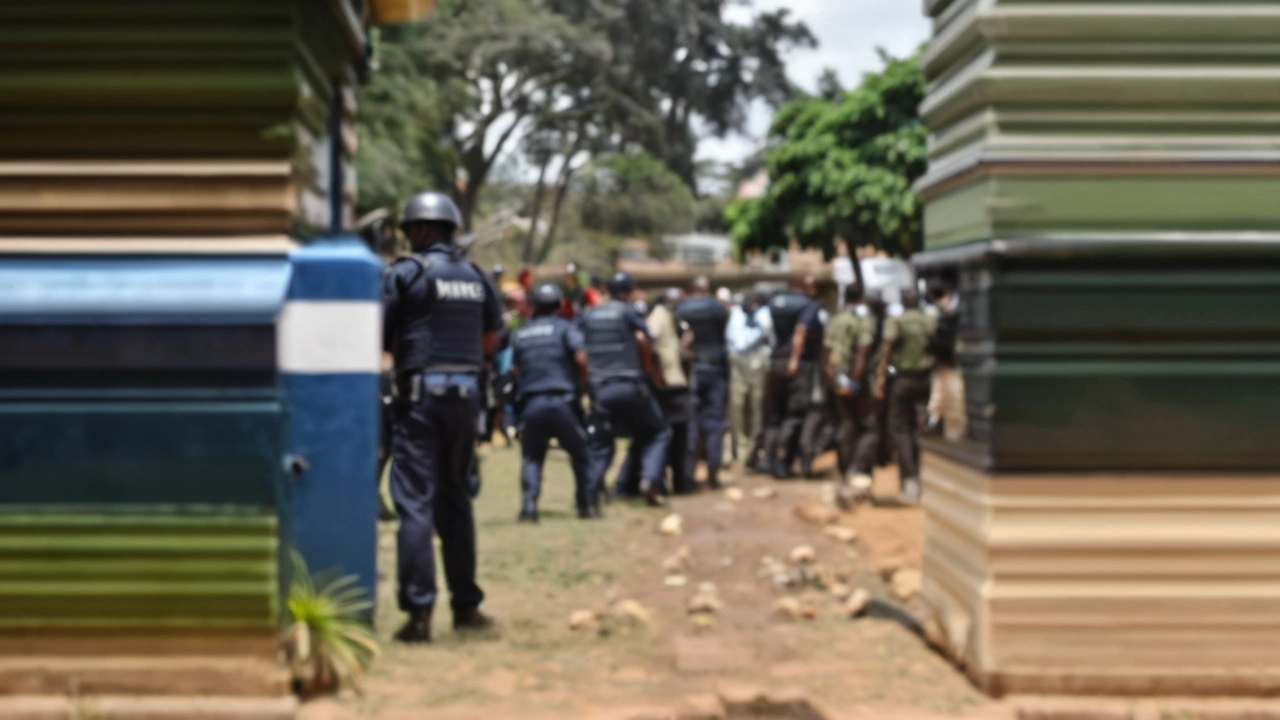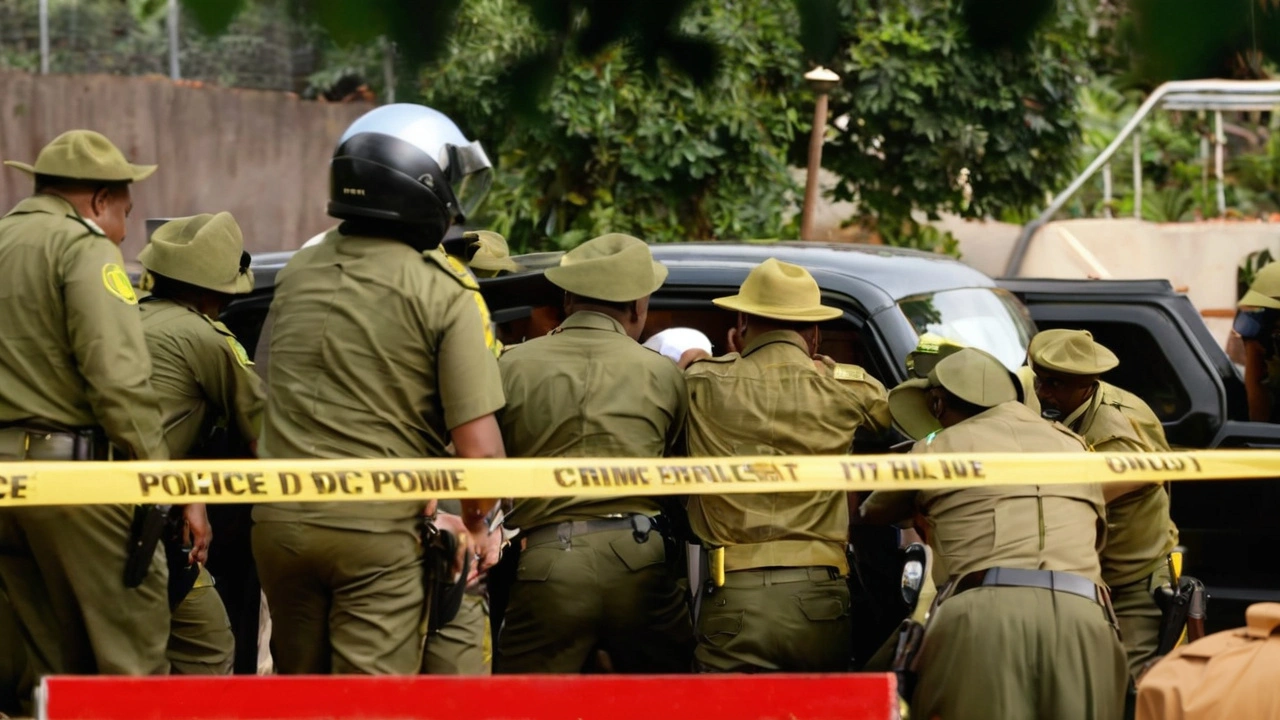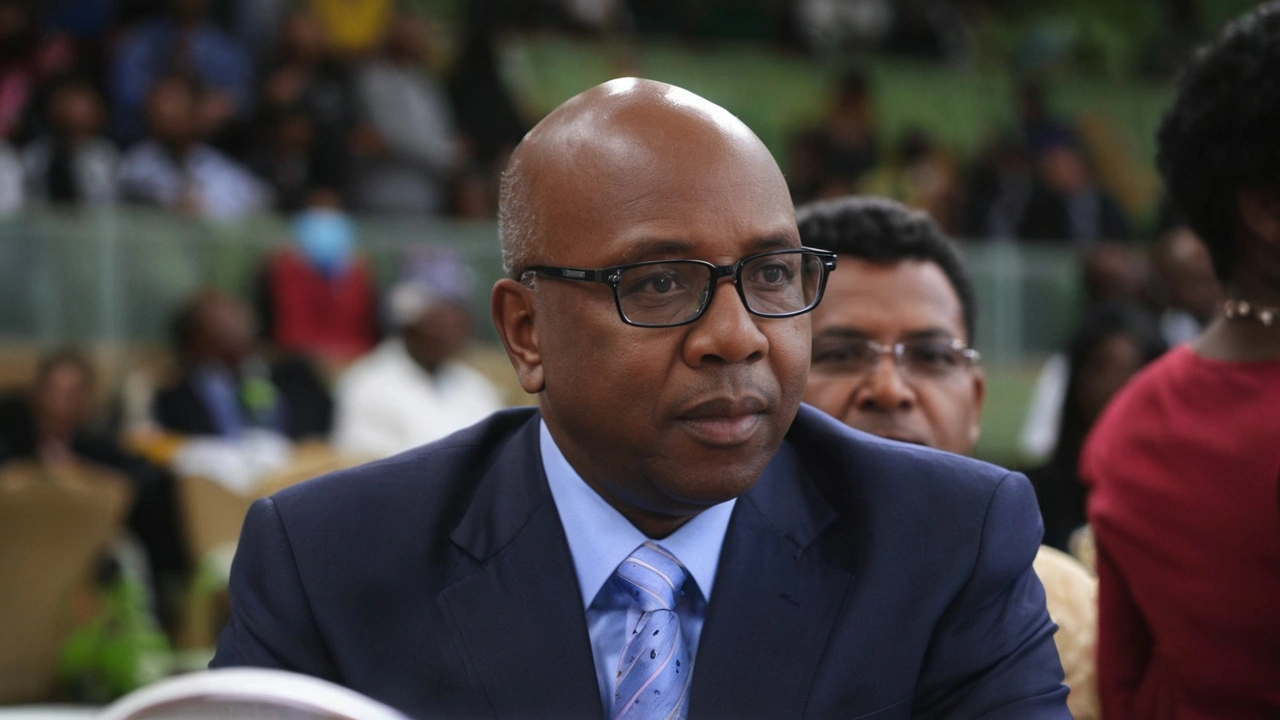Jimi Wanjigi’s Home Raided by Police in Dramatic Standoff: A Continuing Tale of Political Tensions

Jimi Wanjigi’s Residence Encircled by Police in Tense Evening Standoff
The affluent neighbourhood of Muthaiga, a locale synonymous with serene living and luxury, found itself at the heart of a stormy evening on Thursday when police surrounded the residence of well-known businessman Jimi Wanjigi. This dramatic spectacle unfolded as officers laid siege to Wanjigi’s home, marking another episode in the prolonged saga between the businessman and Kenyan law enforcement.
With yellow police tape cordoning off the area, typically used to preserve crime scenes, residents and onlookers gathered, rumors swirling and uncertainties mounting. Wanjigi, a figure as controversial as he is influential, seemed bewildered by the sudden and severe police action. He publicly voiced his concerns, hinting at underlying motives tied to his vocal political stances. 'I don’t know what they want or what I’ve done,' Wanjigi stated, his voice a mixture of frustration and apprehension. 'They are outside the house and want to arrest or harm me,' he added, painting a picture of a man caught in an unexpected and unnerving predicament.
The businessman described the raid as an 'unwarranted invasion,' portraying it as an excessive and unnecessary show of force. According to reports, Wanjigi's troubles supposedly began earlier in the day, when authorities claimed he was seen distributing money along Limuru Road, accompanied by a retinue. Police further alleged that Wanjigi managed to avoid capture by fleeing into Karura Forest, claims that the businessman adamantly denies. 'This is nothing but harassment,' he argued, suggesting that his political viewpoints were at the heart of the police action.

Heightened Police Presence Surrounding Wanjigi's Home
As the evening wore on, the situation escalated with more officers arriving at the scene, amplifying the sense of tension and urgency. Despite the unfolding drama, the police remained tight-lipped, withholding an official statement about the reasons behind the raid, leaving the public and media in a speculative lurch.
Wanjigi, leveraging the power of social media, took to his X platform to broadcast live updates, keeping Kenyans and the wider world attuned to the ongoing developments. Videos quickly went viral, displaying a formidable and seemingly impenetrable police presence outside his residence. The imagery of uniformed officers, police vehicles and the strategically placed yellow tape evoked a scenario far removed from the tranquility Muthaiga is known for.
This latest predicament bears echoes of previous entanglements Wanjigi has had with the law. Notably, in January 2022, heavily armed officers raided his Westlands office, an event that bore striking similarities to the current circumstances. For many, the memories of October 2017 remain vivid, when his Muthaiga home was likewise besieged by police. That particular raid ended dramatically with opposition leader Raila Odinga and his allies camping outside Wanjigi’s home in a show of solidarity.
Past Raids and Continued Controversies
During the 2017 standoff, police claimed to have discovered five AK-47 rifles along with hundreds of rounds of ammunition in Wanjigi's residence. These discoveries fueled accusations of illegal firearm importation against him; allegations he has vehemently denied and continues to refute. Despite these high-profile searches, authorities were unable to detain Wanjigi, who skillfully avoided capture, further mystifying his figure in the public eye.
This pattern of high-stakes confrontations between Wanjigi and law enforcement has led to speculation about the motives driving these raids. Some see Wanjigi as a target of political intimidation, with his vocal criticisms and influential connections making him a thorn in the side of certain powers. Others suggest a more pragmatic perspective, viewing these operations as legitimate actions taken against a businessman whose dealings have come under suspicion.
Adding layers to the narrative, Wanjigi has often positioned himself as a victim of political persecution, a stance that resonates with his supporters and fuels ongoing debates about the state of democracy and justice in Kenya. These tensions within the political landscape are mirrored in the public reaction, where opinions are as divided and multifaceted as the events themselves.

The Political Implications and Broader Context
As the standoff at Wanjigi's home continues to unfold, it thrusts into the limelight broader questions about the intersection of politics, power, and justice. These incidents are not happening in isolation; they occur against a backdrop of a deeply polarized political climate where the lines between lawful enforcement and political vendetta often blur.
For Wanjigi and his supporters, the repeated raids symbolize an ongoing attempt to silence dissent and stifle political opposition. They argue that the excessive force and dramatic flair of these raids are tactics designed to intimidate and destabilize. Conversely, those who defend the police actions posit that Wanjigi’s vast business empire and political activities merit scrutiny and accountability.
Tensions remain high as Kenyans watch the saga unfold, with Wanjigi's every move and statement meticulously documented and disseminated through social media. The businessman, well-aware of the power of public opinion, continues to use his platform to rally support and cast doubt on the legitimacy of the police’s actions.

Looking Forward: What’s Next for Jimi Wanjigi?
As night falls, the situation at Muthaiga remains unresolved, the future uncertain. Jimi Wanjigi, once again at the center of a national spectacle, is left to navigate the rough waters of political and legal conflict. With the police yet to provide clear answers and the public eagerly following each new development, it is evident that this story is far from over.
What becomes of Wanjigi in the coming days and weeks will likely have implications reaching beyond his own fortunes, potentially impacting the broader political dynamics in Kenya. As it stands, Muthaiga is no longer just a haven for the elite but a stage for a gripping and ongoing drama, raising critical questions about power, politics, and justice in the heart of Kenya.
If you think this raid is just about law enforcement, you’re missing the grand chessboard of power. The state loves to dress up political intimidation as “public safety” to keep dissenters in check. Wanjigi’s outspoken criticism makes him a prime target for those who fear a shift in the balance of power. The police tape and flash‑bangs are theatre, not justice. So before we applaud the badge, ask yourself who really benefits from this spectacle.
I see your point, and it’s a sobering reminder that politics can turn law enforcemen into a stage. Still, we should keep an eye on the official narrative.
For anyone not familiar, Kenya has a history of using police raids to send political messages. This isn’t the first time Wanjigi’s house has been surrounded, and the pattern is clear. It’s a mix of legal pretense and power projection.
the thing is that it looks like a power play not a crime scene the community should stay calm and watch the facts unfold
Well folks, i think we need to look at the bigger picture here. The raid could be a message to anyone daring to speak out. It's not just about wanjigi it's about silencing dissent.
What they don’t tell you is that this operation is part of a coordinated effort to cripple opposition before the next election. The timing aligns perfectly with a surge in anti‑government sentiment online. Inside sources say there’s a hidden agenda: destabilizing any network that could challenge the ruling elite. The police tape is just a cover for a deeper infiltration. Even the mention of money‑distribution on Limuru Road is a classic diversion. You see, once the narrative of “corruption” is planted, the public will swallow any excuse for a crackdown. The forest escape story? A myth to make Wanjigi look like a fugitive, while the real flight is the erosion of democratic space. Every officer at the perimeter is likely equipped with directives that go beyond ordinary law‑enforcement. In past raids, they seized unrelated contraband to justify the sweep. This time they’ve brought more media, turning the street into a stage for propaganda. The echo chamber will spin this into a tale of lawful order while the truth remains buried. Remember, the louder the show, the less people question the motive. Ultimately, it’s less about weapons and more about silencing a voice that refuses to be muted.
Strategic posturing, narrative framing, and coercive optics are evident-this operation exemplifies statecraft via police militarization.
Just a quick note: "political" should not be capitalized in this context, and "Muthaiga" is spelled with an "i" not an "e". Also, avoid using the ampersand (&) in formal prose; write "and" instead.
When you peel back the layers of this drama, you see a tapestry woven from threads of fear, power, and history. The police’s heavy presence in Muthaiga is not an isolated incident but part of a continuum that dates back to the 2017 standoff, when Wanjigi’s home first became a battlefield of ideologies. That raid, which allegedly uncovered AK‑47s, set a precedent: any opposition figure who dares to voice dissent may find themselves under the glare of flash‑bangs and yellow tape. The pattern repeats, showing a calculated escalation designed to intimidate not just the individual, but the entire movement that rallies behind him. Moreover, the timing of this raid, coming just weeks before a major electoral cycle, cannot be dismissed as coincidental; it serves as a stark reminder that law enforcement can be weaponized to shape political outcomes. Observers have noted how the media coverage focuses on the spectacle, drowning out substantive discussion about the underlying grievances that fuel Wanjigi’s criticism. This diversion tactic is classic: drown the public dialogue in noise, then let the narrative of “law and order” dominate. In addition, the social media amplification, with live streams and viral videos, transforms the event into a performative act, turning the street into a stage and the police into actors in a state‑sponsored drama. The public, meanwhile, is left to parse fact from propaganda, often without the tools to do so. It is also worth noting that similar tactics have been employed in other African nations where incumbent powers feel threatened, underscoring a regional pattern of suppressing dissent under the guise of security. As the night deepens over Muthaiga, the unresolved questions linger: Will the police produce concrete evidence, or will this remain a theatrical display? How will the judiciary respond when the dust settles? And most importantly, what does this signal to other opposition figures watching from the sidelines? The answers will shape the political terrain for years to come.
Great summary, Christine. It’s clear that the optics are as important as the legal details here. Watching the judicial response will be crucial for assessing the rule of law.
The pattern is evident: state apparatus used to curb opposition. This will likely affect upcoming elections.
Absolutely, Abhijit. The timing is suspicious and the narrative is being carefully crafted. Let’s see if any independent investigations emerge.
While the theatricality is undeniable, one must ask whether procedural safeguards were observed. The lack of an official statement raises concerns about transparency.
Transparency is lacking, and that’s a red flag. The public deserves clearer answers.
We’ve seen these standoffs before, and each time they leave a scar on public trust. Let’s hope this doesn’t become the new normal.
Normal? Hardly. The state’s overreach is evident, and yet the narrative pushes it as routine. We must call out the double standard.
Another predictable power play.
Predictable? Maybe. But the drama is endless, and the spectacle keeps us all distracted. Still, it’s a sour show.
It seems every crackdown hides behind a veneer of legality, yet the underlying motive is simple: silence those who dare to question.
Indeed, Sherri. 👏 Keeping an eye on the facts will help us see through the smoke. Stay informed! 😊